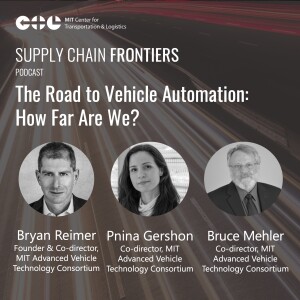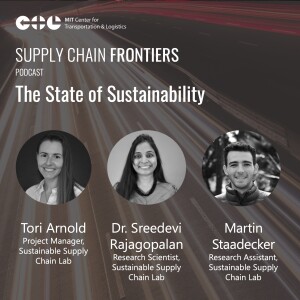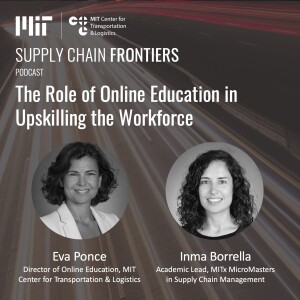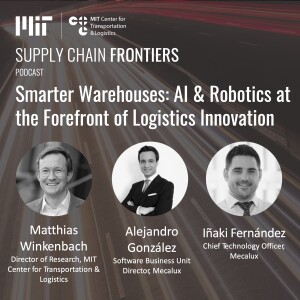Episodes

Wednesday Feb 18, 2026
Decarbonizing Supply Chains with C.H. Robinson
Wednesday Feb 18, 2026
Wednesday Feb 18, 2026
As climate-related disruptions and regulatory pressures intensify, corporate sustainability is a core strategic necessity for all operations of global firms. In this episode, we discuss how companies are navigating the complex transition toward decarbonization while upholding efficiency and affordability.
Joining the discussion are Dr. Sreedevi Rajagopalan and Tori Arnold from the MIT Sustainable Supply Chain Lab, alongside Rachel Schwalbach, Vice President of ESG at C.H. Robinson, and Brittany Brama, Sustainability Director at C.H. Robinson. From the complexities of Scope 3 data collection to the practical implementation of alternative fuels and "book and claim" models, they examine how their collaboration between academia and industry is turning sustainability research into measurable impact.

Tuesday Jan 20, 2026
Beyond the Hype: Decoding AI in Supply Chains
Tuesday Jan 20, 2026
Tuesday Jan 20, 2026
Artificial Intelligence is frequently hailed as a transformative force for global supply chains, yet the gap between technological promise and operational reality remains a central challenge for industry leaders. In this episode, host Dr. Matthias Winkenbach, Director of Research at MIT CTL, leads a nuanced discussion on the transition from AI hype to the implementation of functional "decision technology."
Joining the discussion are three researchers from MIT CTL who bring diverse perspectives to the AI landscape. Willem Guter of the MIT Intelligent Logistics Systems Lab unpacks the intersection of machine learning and traditional optimization in warehouse robotics, while Dr. Elenna Dugundji, director of the MIT Deep Knowledge for Supply Chain and Logistics Lab, explains the evolution of demand forecasting and the importance of "deep knowledge" in predictive modeling. Dr. Bryan Reimer, founder of the MIT AgeLab’s Advanced Vehicle Technology Consortium, rounds out the discussion by addressing the critical human factor in autonomous systems. Together, they examine the future of AI in sourcing and procurement, the complexities of human-AI interaction, and the necessity of building decision-support tools that are grounded in real-world application rather than speculative promise.

Wednesday Dec 17, 2025
Why So Much Food is Lost: Inside Global Food Supply Chains
Wednesday Dec 17, 2025
Wednesday Dec 17, 2025
Global food systems produce more than enough to feed the world—yet nearly one-third of all food is lost or wasted. Much of that loss happens far upstream, driven by perishability, cold chain failures, infrastructure gaps, climate pressures, and supply chain inefficiencies that span continents.
In this episode, we’re joined by Dr. Chris Mejía, founder and director of the MIT Emerging Market Economies Logistics Lab, along with Drs. David Hidalgo and Mauricio Gámez, researchers who model solutions for supply chain issues. They unpack why food supply chains are uniquely vulnerable to disruption, especially in emerging markets, and where the biggest opportunities exist to reduce loss. From circular economy models and food recovery strategies to AI-driven forecasting, optimization, and community-based distribution networks, the conversation explores how better logistics, smarter data, and cross-sector collaboration can help redesign food supply chains that are more resilient, sustainable, and equitable.

Tuesday Nov 18, 2025
Weaponized Supply Chains: U.S.-China Trade and National Security
Tuesday Nov 18, 2025
Tuesday Nov 18, 2025
Rising geopolitical tensions and global trade volatility have revealed a key power struggle: supply chains are a matter of national security. This year’s annual report from the congressional U.S.–China Economic and Security Review Commission warns that China has begun weaponizing key supply chain chokepoints, from critical minerals to foundational semiconductors, creating risks that reach far beyond trade.
In this episode, we’re joined by Livia Shmavonian and Josh Hodges, two commissioners of the U.S.–China Economic and Security Review Commission, along with Professor Yossi Sheffi, Director of the MIT Center for Transportation and Logistics. They discuss key findings from this year’s report: why companies have been slow to recognize the strategic nature of their dependence on China, how subsidies and overcapacity distort global competition, and why innovation remains the United States’ greatest advantage. From U.S. manufacturing limitations to critical mineral processing to market access in China, the conversation explores what’s at stake, what must change, and how companies and policymakers can prepare for a future where supply chain strategy is inseparable from national security.
You can read the full report here.

Thursday Oct 09, 2025
Sustainability Still Matters
Thursday Oct 09, 2025
Thursday Oct 09, 2025
As global supply chains face new waves of political uncertainty, regulatory change, and economic pressure, one thing remains clear: sustainability still matters. The latest State of Supply Chain Sustainability Report from the MIT Sustainable Supply Chain Lab reveals that despite federal environmental rollbacks and shifting investor priorities, companies continue to see sustainability as central to long-term success.
In this episode, we’re joined by Dr. Josué Velázquez Martínez, director of the lab, and Dr. Sreedevi Rajagopalan, a research scientist in the lab. They unpack key findings from this year’s survey—why 80% of firms say sustainability is vital to their future, where companies stand in tracking Scope 3 emissions, and which energy sources could redefine sustainable freight transportation. From biofuels and hydrogen to the data behind carbon accounting, the conversation explores what’s driving progress and why collaboration may be the most necessary sustainability strategy of all.

Thursday Sep 18, 2025
Thursday Sep 18, 2025
Emerging markets play an essential role in global supply chains, providing much of the food, raw materials, and labor that keep the world running. But they also face unique challenges: fragmented systems, limited infrastructure, and volatile economies. At the same time, these regions hold immense potential for innovation, resilience, and growth if their logistics systems can adapt to meet rising pressures from climate change, geopolitical shocks, and shifting consumer demands.
In this episode, we’re joined by Dr. Chris Mejía, Founder and Director of the MIT Emerging Market Economies Logistics Lab (EMeL), along with Research Affiliates Dr. Edgar Gutierrez and Isabel Agudelo. They discuss the launch of this new lab at the MIT Center for Transportation and Logistics, its mission to strengthen supply chains across the Global South, and the human decisions that ultimately shape logistics outcomes. From the fate of mangoes in Ghana to cobalt in the Congo, the conversation reveals why emerging markets matter to everyone—and how building trust may be the biggest logistics challenge of all.

Tuesday Jul 15, 2025
The Road to Vehicle Automation: How Far Are We?
Tuesday Jul 15, 2025
Tuesday Jul 15, 2025
Self-driving cars have been heralded by many as the future of transportation—promising safer roads, reduced traffic, and greater mobility for all. Yet despite rapid advancements in technology and a surge in assistive driving features, acceptance of full vehicle automation remains elusive. As the public grapples with questions of trust, safety, and responsibility, the road to widespread adoption of automated vehicles is anything but straightforward. The stakes are high: how we navigate this transition could redefine the way we move for generations to come. So, how far are we from acceptance, adoption, and implementation?
In this episode, we’re joined by the co-directors of the Advanced Vehicle Technology (AVT) Consortium, hosted within the MIT AgeLab at the MIT Center or Transportation & Logistics: Dr. Bryan Reimer, Dr. Pnina Gershon, and Dr. Bruce Mehler. They explore key insights from their recent research, the role of data in shaping safer and smarter mobility solutions, and how the consortium is addressing critical questions around driver behavior, automation readiness, and industry collaboration as they celebrate their 10th anniversary year.

Tuesday May 13, 2025
The State of Sustainability
Tuesday May 13, 2025
Tuesday May 13, 2025
Sustainability has become an imperative for many companies—but in the face of regulatory rollbacks and budget cuts, are those goals here to stay? In this episode, we explore how companies can meaningfully pursue sustainability, even amid shifting political and economic pressures. We discuss growing public support for sustainability, the role of data and modeling in shaping corporate sustainability strategies, and how companies can build resilient, responsible supply chains.
In this episode, we’re joined by members of the MIT Sustainable Supply Chain Lab, hosted within the MIT Center for Transportation & Logistics: Tori Arnold, Project Manager, Dr. Sreedevi Rajogopalan, Research Scientist, and Martin Staadecker, Research Assistant. The lab’s annual State of Supply Chain Sustainability Survey offers insights into the current state of sustainability across industries—we invite you to complete this year’s survey here (open until May 31st, 2025).

Tuesday Mar 04, 2025
The Role of Online Education in Upskilling the Workforce
Tuesday Mar 04, 2025
Tuesday Mar 04, 2025
In recent years, online education has come to the forefront as an alternative to traditional education programs. Its increasing prominence reflects its adaptability, flexibility, affordability, and far-reaching scale. As the global workforce stands to undergo significant changes in the next 5-10 years due to digitalization, advancements in AI, and automation, employers are increasingly valuing skills over degrees. For workers, this requires a practice of continuous learning.
In this episode, we’re joined by Dr. Eva Ponce, Director of Online Education at the MIT Center for Transportation & Logistics, and Dr. Inma Borrella, Academic Lead for the MITx MicroMasters Program in Supply Chain Management. Eva and Inma discuss the role of online education in upskilling the workforce and the impact of the MITx MicroMasters Program, the first of its kind.
Host & Executive Producer: Benjy Kantor
Marketing Writer & Producer: Mackenzie Berry
Sound Editor: David Benjamin Sound
Audio Engineer: Kurt Schneider

Thursday Jan 09, 2025
Smarter Warehouses: AI & Robotics at the Forefront of Logistics Innovation
Thursday Jan 09, 2025
Thursday Jan 09, 2025
In this episode we sit down with Dr. Matthias Winkenbach, Director of Research at the MIT Center for Transportation & Logistics, Alejandro González, Software Business Unit Director at Mecalux, and Iñaki Fernández, Chief Technology Officer at Mecalux.
Mecalux, a provider of warehouse management solutions, is a founding research partner of the new MIT Intelligent Logistics Systems Lab, which is at the forefront of advancing logistics through innovative technology. We discuss how AI and machine learning are not just buzzwords but can actually create additional value in warehouse robotics, such as in the case of autonomous robots and software solutions that help companies manage demand out of a distributed network.
Host & Executive Producer: Benjy Kantor
Marketing Writer & Producer: Mackenzie Berry
Sound Editor: David Benjamin Sound
Audio Engineer: Kurt Schneider

